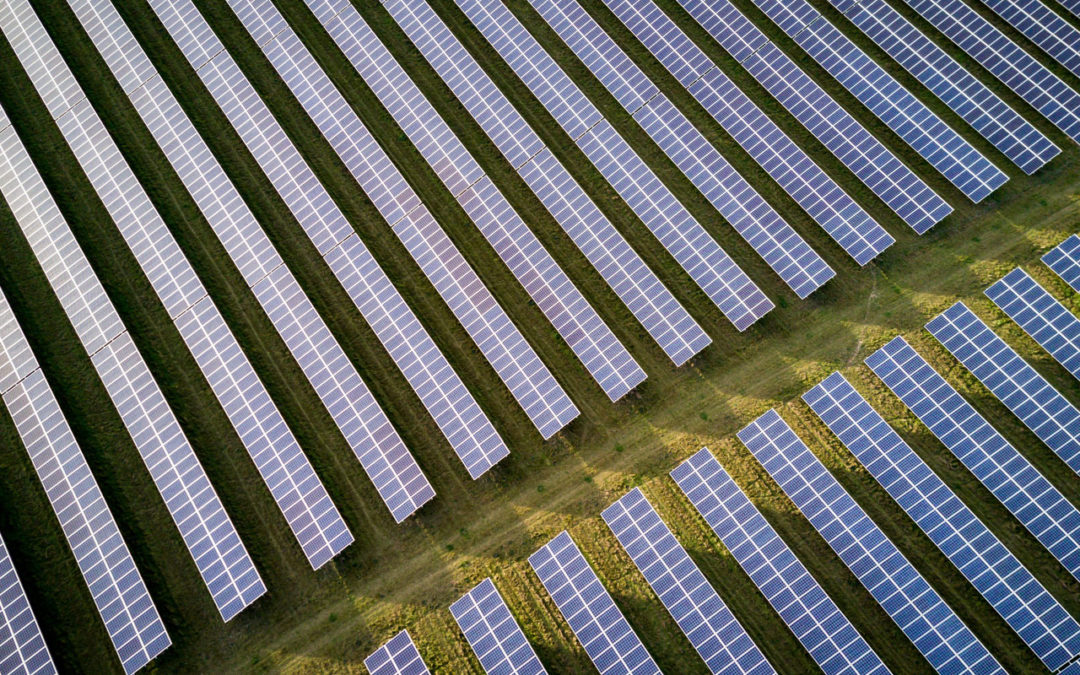
by Michael Vickerman | May 28, 2020 | Local Government, Public Service Commission, Renewables, Solar, Utilities
The volume of solar generation slated to supply power to Wisconsin electricity customers would nearly double if state regulators approve Madison-based Alliant Energy’s ambitious plan to acquire six Wisconsin solar farms for its generation portfolio. Alliant’s application will be filed shortly.
Spanning the state from Grant County in the west to Sheboygan County in the east, the six farms will provide 675 megawatts (MW) of capacity, nearly matching the combined solar commitments made by other Wisconsin utilities thus far.
ALLIANT ENERGY’S PLANNED SOLAR ACQUISITIONS
The projected output from this massive investment in solar generation equates to the average usage of 175,000 Wisconsin households. If approved, Alliant would become the largest provider of solar power in Wisconsin by a large margin (see Table 1).
TABLE 1: RATE-BASING WISCONSIN SOLAR FARMS
This is an astonishing jump from the two megawatts of solar power supplying electricity to Alliant’s Wisconsin customers today. Though Wisconsin has about 150 MW of operating solar capacity right now, by year’s end that number should surpass 300 MW, when the 150 MW Two Creeks plant in Manitowoc County is placed in service. And by the end of 2021, solar capacity in Wisconsin should be within striking distance of a gigawatt (1,000 MW).
This fleet of solar farms will fill the capacity hole that will materialize in late 2022 when Alliant shuts down its 35-year-old Edgewater 5 power station in Sheboygan for good. Earlier this month, Alliant announced plans to retire the 385 MW coal-fired plant in the next two years. Like many other coal plants in Wisconsin and elsewhere, Edgewater 5 has become an increasingly marginal power source, displaced by lower-cost gas-fired and renewable generating capacity.
Though the shutdown of Edgewater 5 can proceed without approval from Wisconsin’s Public Service Commission, the addition of the six solar farms to Alliant’s rate base automatically triggers a PSCW review process. To obtain regulatory approval, Alliant must demonstrate that these six solar farms will reduce its operating costs and provide other tangible benefits to customers without sacrificing reliability.
Alliant’s investment in this tranche of solar capacity should amount to about $900 million and will take the utility two-thirds of the way towards its goal of adding a gigawatt of solar generation by the end of 2024.
As with the first crop of solar farms approved in 2019 and earlier this year, the development work is being undertaken by independent power producers (see Table 2). Two of the projects–Savion Energy’s 49.9 MW Richland County solar farm and Geronimo Energy’s 50 MW North Rock solar farm–have already been approved for construction, but the remaining four require siting permits. The PSCW has jurisdiction over the three largest solar farms, and will issue decisions in late 2020 and early 2021. Jefferson County will review the 75 MW Ranger Power project later this year. Assuming the PSCW green-light’s Alliant’s application to acquire the projects, all six solar farms should be operating before the close of 2023.
TABLE 2: ALLIANT ENERGY’S PLANNED SOLAR ACQUISITIONS
In each year of operation, these projects will pump a combined $2.7 million into the coffers of host counties and townships. Over 30 years, revenues to local governments will top $80 million. Participating landowners will also reap economic dividends in the form of rental income.
One can access Alliant’s application and supporting documents from the PSCW under Docket No. 6680-CE-182. In all likelihood, the PSCW will make its decision on Alliant’s application in early 2021. To learn more about solar farms in Wisconsin visit RENEW’s frequently asked questions page.
Alliant’s application represents a major milestone in the development and provision of renewable energy in Wisconsin. Whether undertaken by utilities, local governments, businesses or residents, each new investment in solar and wind power generation strengthens Wisconsin’s economy and builds cleaner, healthier, and more resilient communities.
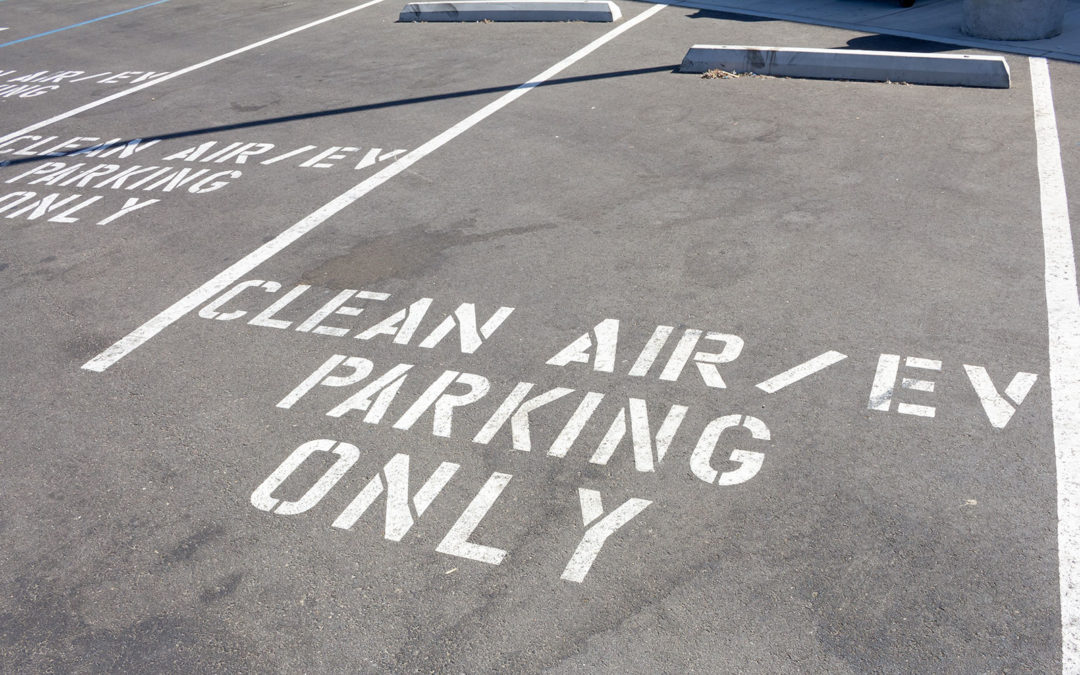
by Lauren Reeg | May 15, 2020 | Community, Electric Vehicles, Jobs, Renewables, Solar, Wind
Imagine a Wisconsin where everyone drives electric vehicles. Additionally, these cars are all powered by clean energy, like solar and wind. Besides quieter travel and different fueling stations, this vision, if realized, would yield significant economic and health benefits for individuals and communities.
With 100% electric vehicle adoption, $6 billion could stay in local economies, and residents could collectively save $3 billion on fuel.
Those are big numbers! Do Wisconsin businesses and residents really spend that much on fuel? Yes! We spent more than $6 billion on motor gasoline in 2017. A clean powered electric vehicle (EV) fleet would allow us to keep $6 billion in the state economy!
Individuals could also save a lot of money. Right now, Wisconsin electricity prices range from 10¢/kWh to 14¢/kWh. Assuming current EV fuel efficiency at .32 kWh/mile Wisconsin residents could save up to $3 billion by fueling electric vehicles with clean power each year. EV owners can also eliminate oil changes from monthly budgets.

This analysis only looks at passenger vehicle travel. If other forms of non-passenger transportation are included, like trucks and aviation, expenditures on petroleum products in Wisconsin rise to a total of $8.4 billion. Non-passenger travel technologies are still in development, but as they progress Wisconsin will have the opportunity to keep even more money in the state.
100% electric vehicle adoption would result in over $2 billion of avoided health and social impacts.
Conventional internal combustion vehicles emit toxic pollutants like nitrous oxides (NOx), particulate matter (PM), and carbon dioxide (CO2). Non-renewable power plants, like coal and natural gas, emit those same chemicals and more. These pollutants have huge negative impacts on our health like increases in childhood diseases, asthma rates and early mortality rates, which lead to huge economic burdens, as well. If Wisconsin residents employed a 100% renewable energy powered EV fleet, we could save more than $2 billion.
The impact of clean-powered EV adoption on health and the environment is substantial, because pollutants are expensive in both the long and short term. The net loss in agricultural productivity, negative human health impacts, property damages from increased flood risk, and the lost value of ecosystem services from carbon emissions is estimated at $42/ton. Passenger vehicles emit on average 4.6 tons of CO2 per year. With more than 6 million registered passenger vehicles in Wisconsin, that’s a price of over $1.1 billion per year. Additionally, particulate matter and nitrous oxides are even more costly at $380,000/ton and $7,800/ton respectively.
By saving billions in avoided health and social costs, Wisconsin can direct more investments to areas like roads, schools, police and fire protection. Every dollar we save in fuel expenditures and avoided pollution impacts can enrich the lives of Wisconsin residents.
To accommodate 100% clean-power EV use, Wisconsin would need to develop 21 million megawatts-hours (MWh) of new renewable energy .
Wisconsin currently consumes about 70 million MWh of electricity per year. To power this future electric vehicle fleet, Wisconsin would need an additional 21 million MWh, which would increase electricity generation needs by about 30%.

To help illustrate this amount of renewable energy, let’s assume that solar power will supply one-half of the additional 21 million MWh of electricity and wind power would also supply one-half of this amount. Assuming that each new renewable power plant would average 100 MW, we would need to add 52 solar farms and 35 wind farms.
Renewable energy is already one of the fastest growing job categories in the country. Currently, 76,000 Wisconsinites are employed by the renewable energy industry. Wind and solar projects employ research engineers, manufacturers, scientists, construction workers, real estate brokers, and so much more. Studies show that wind projects can create at least 2 jobs/MW per year in construction and manufacturing jobs and up to 1 job/MW in operation and maintenance jobs. The solar industry can create up to 8 jobs/MW per year for construction and manufacturing jobs with up to 2 jobs/MW in operation and maintenance. If Wisconsin employed the renewable energy mix detailed earlier, even a cautious job estimate would be over 250,000 jobs created!
The premise of 100% electric vehicle adoption powered by 100% clean energy highlights a real opportunity for Wisconsin, keeping $6 billion in our local economies and reaping $2 billion in saved social costs, while creating tens of thousands of jobs for Wisconsin residents.

by Guest Blog | May 4, 2020 | Biogas, Electric Vehicles, Renewables, Solar, Wind
Review by Don Wichert
Michael’s Moore’s film, Planet of the Humans directed by Jeff Gibbs, is a poorly researched and conspicuously one-sided example of advocacy journalism. The film’s release on YouTube coincided with the 50th anniversary of Earth Day, prompting a well-deserved panning from many writers and reviewers with deep roots in the environmental and clean energy community.
The major shift from a world dominated by fossil fuels to one run by renewable energy is a monumental shift that cannot be made over night. Gibbs narrates a description focusing almost entirely on the slowness of this shift and on the inevitable failures of various attempts to move towards a more sustainable world. Much like evolution itself, some mutations towards this goal succeed and others don’t. It’s called “learning by doing”. Unfortunately Gibbs only describes those early experiments gone badly or interviews people who are not qualified to explain the goals and the process of development that is being considered.
Much of the reporting is one sided, not researched very well, outdated, and inaccurate and is simply inexcusable. Some examples:
- Interviews with GM officials in 2010 when the Chevy Volt was introduced. The Volt has gotten great reviews over time as a first generation Electric Vehicle that also has a gas engine. However, since it is typically recharged from the electric grid, which at the time was powered primarily by coal from the Lansing based utility in 2010; it’s portrayed as a phony sustainable alternative. No mention was made of electric cars being 85% energy efficient vs. internal engines being 15% efficient (of energy in the fuel to the wheels on the road). Since 2010, about 100,000 megawatts of coal plants have been shut down and replaced by renewable energy or natural gas. So, the grid has become greener, and therefore driving an electric vehicle has become greener over time.
- In the same ten year old footage, Gibbs interviews a Lansing Power and Light official who explains how their experimental solar electric system works. The panels are low efficiency (about 8%) and the official estimates that the football sized solar field can produce the equivalent of eleven household’s annual electricity usage. In the last ten years, solar has become more efficient and the costs have dropped dramatically. Solar is now the among the most affordable ways to generate electricity in most places in the US and the world. This is not mentioned, nor is distributed solar electric power mentioned, which uses the solar energy produced and used at the site.
- Gibbs spends a lot of time interviewing Ozzi Zehmer, author of the “Green Illusion”. Zehmer makes the outrageous claim that silicon solar cells have no silicon and instead are made of quartz, coal, and rare earth metals. It is true that some carbon is added to the solar cells in the production process, but it is subterfuge to imply that more fossil fuels are used in the process then the carbon saved by the cells over their lifetime. Many studies have shown a payback on carbon from solar cells of about two years. However, there is concern that some rare earth metals will not be enough to meet an exponential demand in the future from solar panel and other electronics. Innovation in the future may be able to resolve this apparent rare earth emerging problem.
- Gibbs interviews a “solar salesman” at a trade show who said the lifetime of solar cells is “about 10 years.” However, every solar cell manufacturer offers a 25-year guarantee on their cells to produce at least 80% of the power by year 25. Although there is output degradation of about 0.5 percent per year, it likely that solar cells will be producing power many decades past their 25 year warrantees.
- The movie then shifts to wind power and singles out one potential site on the Lowell mountain in Vermont. Gibbs interviews the group of hikers that are opposed to the 21 turbine ridgeline project because it will destroy the vista and hiking that has been there before. He does not mention the environmental review that was done for the project nor that the project was approved by a 342 to 114 vote in the local town in 2009. He does not interview anyone in the area that was in favor of the project, or mention the actual impact on hunting, hiking, sound, the fossil power that it’s replacing (or other conservation measures), or the economic impact of the project. Nope, just those against the project. Gibbs also interviews others at wind construction sites, who described the amount of concrete, steel, and weight of the wind turbine projects, as if all construction of anything was bad. Does he oppose a bridge over a creek because some steel and concrete is being used?
- Gibbs also takes a slap at hydrogen used as a fuel source for autos. Even though hydrogen is not really being considered as a near-term replacement, he gets a response from a person at a trade show that the hydrogen fuel comes from fossil fuels. He does not mention that hydrogen can be made by using electrolysis of water powered by surplus renewable energy when supply exceeds demand or that the only emissions of hydrogen combustion is water.
- The film also makes short shrift of battery technology, even though battery storage is likely to become a game changer for scaling up renewable energy. Humans are on the very beginning of a tidal wave of innovation and discovery with battery storage, with new concepts and options to store more with less weight, occurring at a rapidly increasing rate.
- Gibbs and Zehmer then go to the southwest deserts where some large scale solar thermal to electricity systems were deployed. They visit the original site of the Solar Energy Generation System I (SEGS-I), built in 1986, 34 years ago. Out of the nine systems SEGS built over this time period they focused only on the first one, where it was dismantled and apparently is being repurposed to a newer system. No attempt was made to interview the owners of the system or to show the other eight systems that are merrily producing power at one of the sunniest sites in the US. Gibbs did show some footage of yucca plants and Joshua trees being cut down for the solar array construction. No energy system is completely benign, and tradeoffs are always made. The world is a lot different than it was before the advent of farming or the industrial revolution, and ethical choices of land use can always be challenged. Manhattan, Chicago, and Madison do not look like they did 300 years ago. The projects need to file environmental impact studies before they are built, but none of that is described.
- There are criticisms of the solar power towers near Barstow, CA. I never liked this concept either: large, moving parts, low thermal efficiencies, and the need for maintenance. However, it is an example of how major infrastructures shifts occur: start out with what you know (large, thermal power plants) with those who build them (Bechtel, Westinghouse) and see what happens. These plants were started in the 1980’s, and in this case, their failures will hopefully lead to learning.
- Gibbs also attacks environmentalists for taking funding from fossil fuel interest groups like the Koch brothers and others. The optics don’t look good, but most large corporations, energy or others, have a diversified portfolio of projects with new and old technologies. Sometimes old money is a major contributor to a better world in the future like the Carnegie libraries or the Rockefeller Foundations. Gibbs targets the Green Century Fund and cherry picks several companies that have a dirty image, but fails to highlight which part of these companies are being supported in the fund.
- The film charges that any business that claims to be 100% renewably powered while remaining connected to the utility grid is engaging in deception. In point of fact, it is possible to be 100 percent renewably powered and still use some power from the grid when needed, so long as the customer offsets its draw from the grid with an equivalent amount of excess renewable energy. Until batteries are more developed, having backup sources of power, whether from the grid or other means, makes total sense. There is a picture of Tesla’s mega battery plant before the roof was covered with solar electric panels, implying that Elon Musk was lying when he said the plant would be 100 percent renewable since it would still be connected to the grid. They also showed some diesel generators being used for back-up power at an Earth Day concert.
- But Gibbs biggest gripe is with bioenergy. He never explores the major renewable premise that biomass is recent solar energy stored in plants, or that most of the biomass feedstock is from wastes that would otherwise oxidize and slowly release methane and carbon dioxide in the process. He shows the McNeil wood-fired power plant in Burlington (VT), with piles of trees and wood chips outside ready to be burned. He never explores that 95 percent of this feedstock comes from timber product residues, culls left over after other logging operations, land clearing for development, tree trimming for power lines, forest thinning, or even dedicated biomass farms for fuel. He did not interview the fuel procurement personnel or say anything about the environmental scrutiny that is required in the fuel procurement process or anything about the sustainable guidelines that must be followed.
- He also makes light of a biogas digester at a zoo that takes elephant manure to produce energy. He does not explore the concept of modern biogas digesters and how they take raw manure from large animal operations, or landfill and wastewater treatment gas and make electricity and pipeline quality gas. Nor does he say anything about the reduction in pathogens and smell from these operations and the production of biosolid fertilizers.
- The film interviews a number of people living near solid waste incinerators as part of the biomass-to-energy portfolio of bad projects. It’s true that the track record of waste-to-energy plants has been spotty at best, but this is another example where projects started in the 1980’s to hedge against the energy crisis are now no longer being built. Mistakes were made, and from them, other ways to tackle problems emerge. Figuring out how best to recycle tires, hazardous wastes, and plastics is still a major problem to be solved.
There certainly are legitimate arguments being made that we humans are having a deleterious impact on the planet: over fishing of the oceans, acidification of the oceans destroying reefs, climate change impacts of more intense and frequent storms and droughts and ecosystem shifts, ground water depletion, plastic pollution, and too many people wanting too much stuff. But in Gibbs and Moore’s eyes, the glass is not half empty, but is almost dry. He completely ignores any discussion by the vast army of individuals, governments, and companies trying to fill the glass back up with clean water. No, everything anybody does is bad and evil according to the film. That includes Al Gore, Bill McKibben (founder of 350.org), Michael Brune (ED of Sierra Club), Michael Bloomberg, whose philanthropy underwrites Sierra Club’s Beyond Coal Campaign, and Dennis Hayes, coordinator of the first Earth Day in 1970. According to Gibbs, all environmental leaders are phonies and have sold out for themselves and their imperfect goals.
Renewable energy is still at an early stage of development and huge progress is being made at an accelerating pace. The first auto was made in 1885 and every year new innovations are being made. It’s almost impossible to conceive what we humans will be using for energy in the years ahead, but progress is being made every day.
The beginning of the film asks about 10 people off the street how long they think humans will survive. Guesses range from about 10 years to infinity. So there are a lot of opinions, some positive and some negative. Unfortunately, this film is all negative. It was probably meant to sound like a canary call in a coal mine, but it was way too one-sidedly negative. Things may be bad, but looking over human history, as Dr. Pangloss said in Voltaire’s Candide, “it’s the best of all possible worlds.” Too bad Moore and Gibbs didn’t do a better job researching to provide a balanced and more positive perspective on getting to the best of all possible worlds.
I cringe thinking of how right-wing media will use this film to cast doubt on the value of renewable energy and the purposeful goals of those involved in trying to make a more sustainable human earth.
Don Wichert is a self-proclaimed “Energy Geek”, with college degrees in Geography, Thermal Engineering, and Energy Analysis & Policy. He worked at the Wisconsin Energy Office for 23 years as Chief of the Energy Resources Section, was Director of the Focus on Energy Renewable Energy Program for six years, and interim Director of RENEW Wisconsin, a group he founded in 1989, for 16 months. He has served on a number of national nonprofit boards, including the Interstate Renewable Energy Council, the Clean Energy States Alliance, and the Biomass Energy Research Center. He lives in Madison, WI.
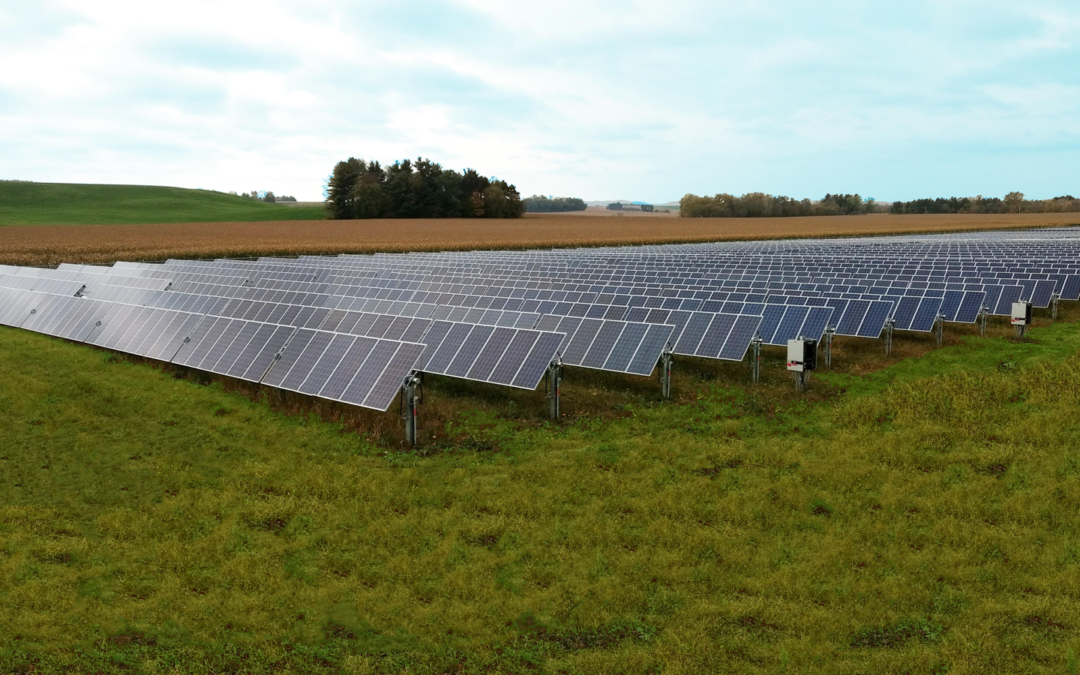
by Michael Vickerman | Apr 30, 2020 | Local Government, Programs, Public Service Commission, Renewables, Solar, Utilities
The Public Service Commission this week signed off on the newest solar farm slated for construction this year in Dane County. This solar power plant will cover 58 acres at the northern end of Dane County Regional Airport, and will involve more than 31,000 panels mounted on single-axis tracking systems. Madison Gas & Electric (MGE) will own and operate the solar plant, and expects to complete construction in the fourth quarter of 2020.
MGE’s solar field is noteworthy in that it will produce clean electricity for only one customer: Dane County. This will be the first example in Wisconsin of an offsite solar project dedicated to a single customer, albeit one with multiple facilities in MGE territory.
Through a long-term contract with MGE, Dane County will purchase the project’s output to offset its own purchases of grid-supplied electricity over the course of the facility’s 30-year-plus life. At nine megawatts (MW), the facility should produce on average 18 million kilowatt-hours a year. All told, the solar farm’s output should equate to about 40% of the electricity consumed at county-owned facilities served by MGE.
The PSC decision contained two separate approvals. First, the agency approved the power purchase agreement between MGE and Dane County, which is provided through the utility’s Renewable Energy Rider service. Under the contract, Dane County will pay 5.8 cents/kWh for electricity generated in the first year of operation, which will result in immediate savings. That price will escalate 2% per year over the contract’s term, which should track closely with anticipated increases in utility energy costs. After 30 years, Dane County will have paid off MGE’s entire investment.
The PSC also authorized the expenditure of $16 million to permit, build, and operate the solar field at the airport. The installed cost of the project equates to $1.78/watt, in line with other, smaller utility-owned projects such as MGE’s 5 MW facility now under construction at Middleton’s Morey Field.
Dane County is the third MGE customer to take service from an offsite solar array built under the Renewable Energy Rider service, following in the footsteps of the City of Middleton and the Middleton-Cross Plains Area School district. Those two customers have committed to purchase the output from a combined 1.5 MW share of the Morey Field solar array, which should commence operations in June 2020.
Notwithstanding its voluntary nature, MGE’s Renewable Energy Rider program has proven to be an attractive option for local governments that have adopted aggressive clean energy goals but are limited in their capacity to host solar systems on all their facilities. Later this year, MGE will file an application to build a 7 MW solar farm to serve the City of Madison and the Madison Metropolitan School District (MMSD). As with Dane County, MGE is the electric provider for many facilities owned by the City and MMSD. The solar array will be located near the Dane County Landfill in southeast Madison.
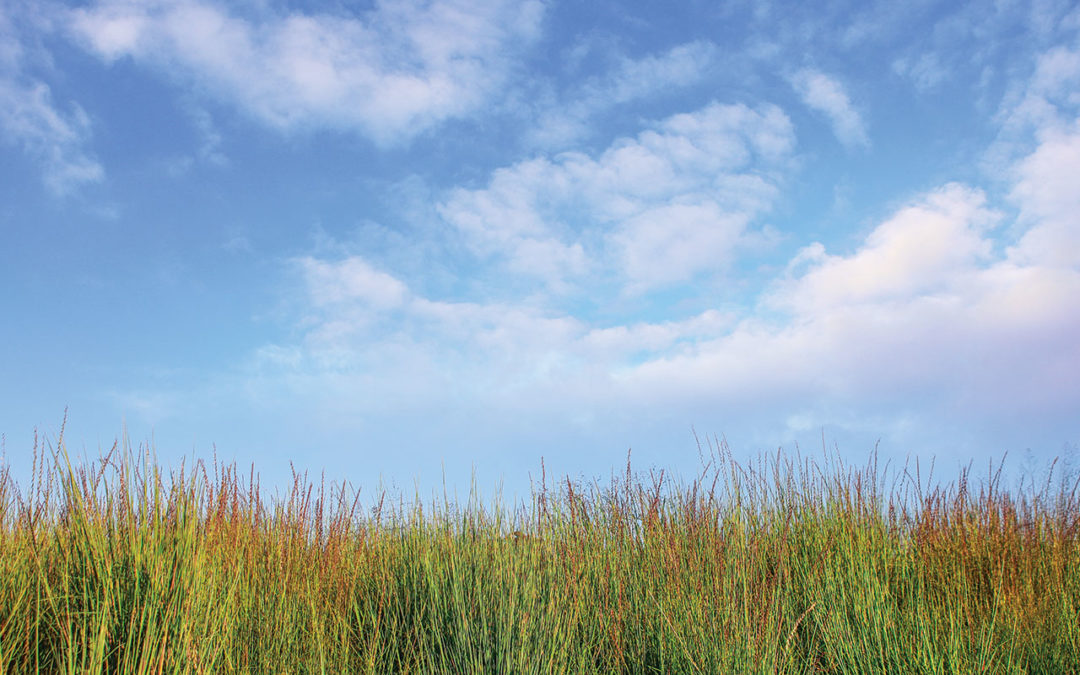
by Jane McCurry | Apr 6, 2020 | Community, Electric Vehicles, Health, Renewables
It’s been two weeks since Governor Evers’ Safer at Home Order came into effect. Our thoughts are with everyone affected by COVID-19 and those working to keep our communities safe and healthy.
This “new normal” means vehicles are staying parked, stores are temporarily closed, and the way we use energy is changing dramatically. In many large cities normally plagued with air pollution, it means unprecedented blue skies and fresh air. Experts predict this flow of fresh air will only be temporary, but here at RENEW, we are working toward a future where our air is always clean. We know this reality can be achieved with more renewable power and electrified transportation.
Less Travel Means Cleaner Skies
From China to Chicago, air quality has improved exponentially since stay-at-home orders were initiated. In Chicago, the nitrous oxide levels in the air have decreased dramatically, and it’s estimated that the improved air quality in Wuhan, China has saved 50,000 lives. All over the internet you can find pictures of the Venice canals and Los Angeles Valley looking cleaner than we’ve seen in decades.
We are by no means doing a cost-benefit analysis on the coronavirus impacts – the devastating impacts of this novel virus will be felt for years to come. However, it can be a useful and important reminder that clean air is better and possible for everyone. There is mounting evidence that poor air quality can actually make people more susceptible to catch COVID-19 and other respiratory viruses, and it could make treatment more complicated too.
Clean Energy Makes Resilient Communities
This newfound clean air can stay. Clean energy technologies like the ones RENEW has been touting for decades have the ability to keep our air clean and our communities safe. Electric vehicles don’t have a tailpipe; they operate without producing emissions in densely populated areas. Clean power generation means areas near power plants no longer suffer the negative health impacts of fossil fuel emissions.
When our health is secure and we start to rebuild our economy, it’s important that we lock in the benefits that clean air can offer us. Now, more than ever, we need to prioritize the public health benefits of accessible, affordable, clean and safe energy.
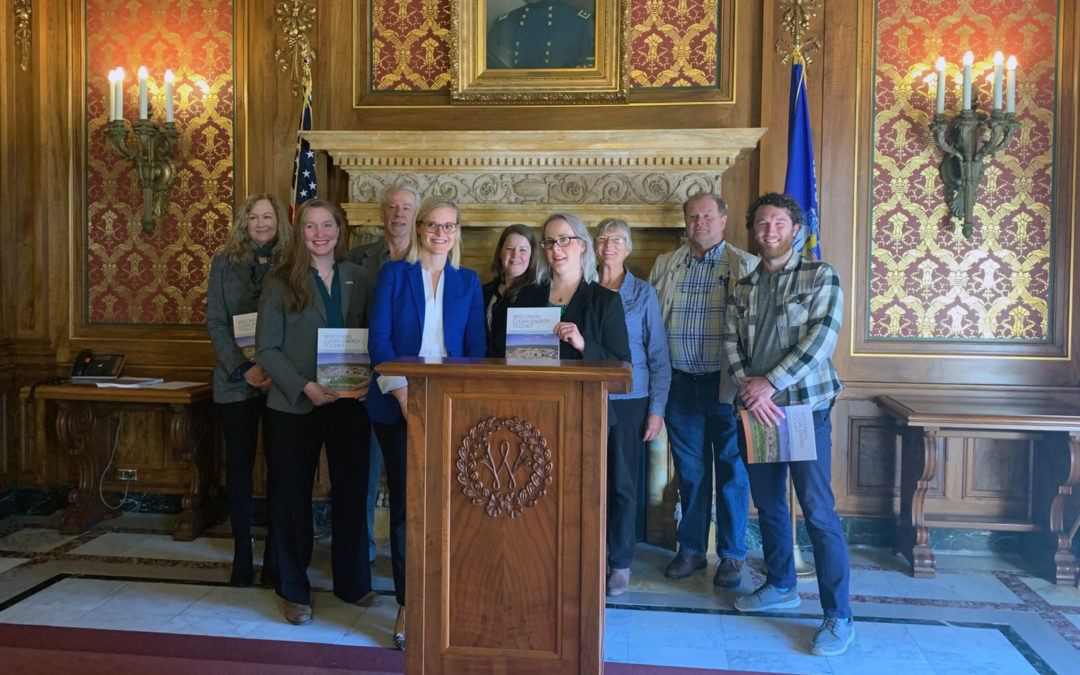
by Heather Allen | Mar 10, 2020 | Advocacy, Community, Local Government, Local Initiatives, Policy, Programs, Public Service Commission, RENEW Wisconsin, Renewables
RENEW Wisconsin, Wisconsin Conservation Voters, and Sierra Club have released the Wisconsin Clean Energy Toolkit: Developing a Clean Energy Plan for Your Community.
Towns, villages, cities, and counties in Wisconsin are building the renewable energy economy. The Wisconsin Clean Energy Toolkit recognizes this leadership in Wisconsin communities and the opportunities to expand these efforts across the state.
As part of its statewide launch, clean energy leaders, including Wisconsin State Treasurer Sarah Godlewski, addressed members of the media and the public across the state on March 10th, 2020 to announce the release.
“The Wisconsin Clean Energy Toolkit will help communities develop clean energy plans, which are good for the environment and also can be good for a community’s bottom line,” said State Treasurer Sarah Godlewski. “I’ve seen this firsthand as the Chair of a $1.2 billion trust fund, how we’ve helped local governments finance projects such as solar panels that saved taxpayers’ money. I hope communities across the state see us as a partner in their projects to address climate change and lower energy costs.”
Local communities across Wisconsin are eager to develop and implement clean energy plans. Often, they struggle with how to begin from a technical perspective and how to engage their communities.
“Smaller communities often lack the staff to conduct clean energy assessments and make recommendations,” said Jennifer Giegerich, Government Affairs Director for Wisconsin Conservation Voters. “This toolkit is a comprehensive resource for those considering a commitment to clean energy.”
The Wisconsin Clean Energy Toolkit is a comprehensive guide to energy policy options in Wisconsin. The toolkit is a resource designed to help guide communities of varying sizes and with differing resources as they consider, craft, and implement clean energy policies, and how to ensure the greatest return on potential clean energy investments.
“Local governments have heard from their residents; they want to shift to clean, renewable energy,” said Heather Allen, Program Director for RENEW Wisconsin. “But they need resources and technical support to make the transition. This toolkit offers practical strategies to help communities access affordable clean energy.”
“The Public Service Commission’s Office of Energy Innovation is committed to delivering programs that have a measurable impact on our state, this is why we’ve supported the Energy Independent Communities and will continue to support (with grants and technical assistance like this guide) communities and Tribal Nations on the road to our clean energy future,” Megan Levy, Local Energy Programs Manager & Energy Assurance Coordinator, Office of Energy Innovation, Public Service Commission of Wisconsin.
The Clean Energy Toolkit provides information to help local communities including:
- How to understand current state policies and regulations that impact energy use in Wisconsin
- Guidance on how to commit to clean energy
- How to build support in the community for clean energy policies
- How to establish a baseline of current energy use in the community, and how to set benchmarks to track progress toward long-range goals
- Defines equitable carbon reduction strategies that protect vulnerable communities when making the transition to clean energy, and how to ensure all impacted constituencies have a voice at the decision-making table
- Provides an overview of various financing options available to local governments to pursue clean energy
“As Wisconsinites demand action on climate change, local communities are answering those calls,” said Elizabeth Ward, Director for Sierra Club Wisconsin. “We’re glad to provide a resource for those communities as they demonstrate the leadership we’re missing at the federal level.”
The toolkit is available to download at www.wicleanenergytoolkit.com. For additional information, questions, or to request a paper copy of the toolkit, please contact Heather Allen (heather@renewwisconsin.org)
Visit www.wicleanenergytoolkit.com to learn more.








